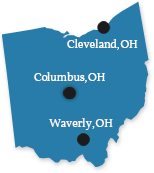In some ways, a traffic crash with a drunk driver is the same as any other motor vehicle accident. Liability for injuries and other damages typically lies with the person whose negligence caused the accident. In some situations, that responsibility may be shared.

But there are a few special considerations if you have been hit by someone who was driving under the influence.
Claims Against the Impaired Driver
Negligence in a Drunk Driving Accident
In a negligence-based lawsuit, the injured party must show that the other person had a duty of care, that they breached that duty of care, and that the breach caused or contributed to the accident and injuries. One duty of care Ohio drivers have is to follow traffic safety regulations, including refraining from driving under the influence of alcohol or drugs. A driver who breaches that duty by driving drunk and causes harm is typically liable for damages.
However, it is important to note that the injured party must still prove that the driver failed to exercise the required degree of care, and that the breach was the cause of their injuries and other losses. Some states deem it “negligence per se” if the driver was violating a traffic safety law at the time of the accident. That means the driver is automatically considered negligent.
Ohio does not recognize this doctrine with regard to traffic offenses. However, a separate Ohio statute shifts this burden when certain crimes are involved.
Tort Liability for Criminal Acts in Ohio
Ohio Revised Code §2037.60 provides that the defendant in a civil case is precluded from denying certain facts in that case if:
- A final judgment of conviction has been entered by a trial court based on either a guilty plea or a verdict at trial;
- That judgment has not been set aside or vacated by subsequent court proceedings, such as an appeal; and
- The offense was punishable by a sentence in excess of one year in prison (for practical purposes, in Ohio, this means a felony offense).
The defendant may challenge the facts in the rare circumstance where they can establish that they were denied an opportunity to fully and fairly litigate the issue in the criminal court. The court may also take into account any pending appeal.
RELATED: Marijuana-Related Car Crash Statistics
This statute not only reduces the burden on the plaintiff to establish that the defendant is liable, but also provides for costs and attorney’s fees. A plaintiff in a personal injury case is typically responsible for their own fees and court costs. But when a person is injured in the commission of a crime, the defendant may be ordered to pay those costs.
Restitution in Ohio Drunk Driving Accident Cases
Ohio criminal courts have the authority to order a person convicted of a crime to pay restitution. The criminal court has a powerful enforcement mechanism, since making restitution may be a condition of probation. Someone who has the ability to pay court-ordered restitution in a criminal case and fails to do so could face revocation of probation or other sanctions, and could serve jail time.
Court-ordered restitution is set off against any civil claim, meaning that the injured person can’t recover the same damages twice. Still, it is often to the injured person’s advantage to pursue a civil claim in addition to the restitution order.
That’s because restitution is limited to economic damages. In a civil suit, non-economic damages such as pain and suffering and loss of enjoyment of life may add significantly to the verdict or settlement amount. In some cases, punitive damages may increase the award even more.
Third-Party Liability in Ohio Drunk Driving Injury Cases
In some cases, a third party may have contributed to an Ohio drunk driving accident. The most common involves the bar, restaurant, or other licensed establishment that provided the alcohol to the driver. Note that simply having been the provider of the alcohol does not result in liability.
Under Ohio law, the establishment or employee may be deemed responsible for the acts of an intoxicated person that occur away from the establishment’s premises only if:
- They knowingly sold an intoxicating beverage to a person who was already noticeably intoxicated; or
- They knowingly sold an intoxicating beverage to an underage person; and
- The intoxication caused the harm.
Depending on your circumstances, you may or may not be able to successfully pursue a claim against the establishment that served alcohol to the intoxicated driver who hit you. In some cases, there may be other third parties who bear or share responsibility. For example, someone who loaned a vehicle to a friend or family member who was obviously intoxicated may have acted negligently.
To learn more about who may be responsible when you’ve been hit by a drunk driver and what type of damages you may be entitled to in Ohio, schedule a free consultation with one of the experienced car accident lawyers at Plevin & Gallucci right now. Call us at 855-4PLEVIN or fill out the contact form on this site to get started.

